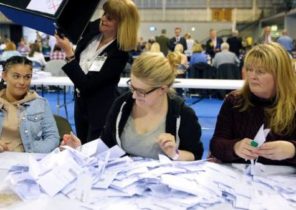
When it comes to the protection of the saints, the Russian Minister of culture may even be rude. All those who criticize “28 Panfilov” are just scum, said Vladimir Medinsky. The Ministry provided financial support for the film, which in Hollywood manner again tells the story, known since Soviet times for every child in Russia. Autumn of 1941, the German Wehrmacht is at the gates of Moscow. To save the Motherland from the enemy, 28 soldiers selflessly enter the battle and achieve incredible results. Armed only with Molotov cocktails and hand grenades, they were able to destroy 18 German tanks, and then killed themselves. Almost single-handedly, they stopped the Germans.
Used in the new movie special effects allow even more realistic to imagine the battle took place. But it doesn’t change anything, because in the story there is one catch — it was completely fictional. The red Army in December 1941, indeed, stopped the Wehrmacht at the borders of Moscow, and then moved into a powerful counter-attack — but it all happened as a result of actions of millions of soldiers, while the heroes of the film, led by their commander major General Ivan Panfilov is a fiction.
It has long been well known — at least to historians, as well as proven conclusively. In 1948, an inquiry has been held the chief military Prosecutor of the USSR Nikolay Afanasyev. As a result, he came to the conclusion that an employee of the army newspaper “Red star” made up that story, using as its Foundation, unverified reports from the front. This investigation was undertaken after many of the alleged martyrs was quite alive, and wanted to get their order. The editors of the newspaper “Red star” just took their names from supplier lists. In fact, Panfilov’s division was at that time in the village Dubosekovo, as alleged, and at a considerable distance from him.
“Those who questioned these feats, will burn in hell”
In 2015, the head of the Russian State archive Sergey Mironenko has published the report of the Military Prosecutor’s office, caused indignant reaction of conservative politicians and intellectuals. The Minister of culture Medinsky advised then that authoritative historian to refrain from expressing their own evaluations. Eventually Mironenko lost his job. Meanwhile the state continues to cling to this myth. In any case, across the country in the name of the heroes-Panfilov, named the streets and squares, as well as one mountain and one mountain pass in the Altai (as in the text — approx. TRANS.). In addition, there are monuments, in particular, in Dubosekovo, and in Kazakhstan, where he was born, some raised to the rank of heroes soldiers.
 © RIA Novosti, Vladimir Song | Jump in potamanthidae with the image of the 28 Panfilov in Moscow
© RIA Novosti, Vladimir Song | Jump in potamanthidae with the image of the 28 Panfilov in Moscow
Vladimir Putin attends the premiere of the film together with President of Kazakhstan Nursultanov Nazarbayev. According to the press-Secretary of Putin, Dmitry Peskov, the Russian President heard about the existing doubts, and so “the film from the point of view of historical truth is of particular importance”. Sands relies on the opinion of the Minister of culture, who said that this film is closest to the true events. In the end, himself Medina said that history should be perceived as a legend of the saints — those who all is considering under a magnifying glass and “in search of the truth casts doubt on the heroism of these people will burn in hell.”
While the predatory war of the Germans, a war of extermination, not represented in the system memories of the Federal Republic or one memorable day, in Russia it is widespread — although primarily in the form of a carefully cultivated state of myths. “Victory day”, celebrated on may 9, after the New year is the most important holiday in this country. However, the memory of the past is not limited to monuments and parades on red square. It is woven into the fabric of daily life — the buses are decorated with the words “To Berlin” cars ironically marked with stickers with the word “Trophy”.
“Great Patriotic war” is the unifying element is filled with gaps of history. Millions of victims of the fratricidal conflict after the revolution of 1917, the civil war and red terror are the reason that society was broken. However, against fascism in the period from 1941 to 1945 fought the descendants of whites and Communists, as well as Christians, Muslims, Russians, Chuvash and Tatars. There is almost no family that has not lost someone in this war its members.
How deep is this experience in the hearts of people, and how easy it is to manipulate them for political purposes became evident after the Maidan Revolution, when the Kremlin and state media indiscriminately opponents of a corrupt clique of Viktor Yanukovych were called Nazis, and thus mobilized their own people to support the annexation of the Crimea and war on Donbass.
A similar role of the “Great Patriotic war” against Nazi Germany acquired a few decades later. A Victory parade was held in June 1945. However, after that during 20 years anniversary of the victory was not noted. “This victory instilled confidence in people that didn’t like Stalin, — said Moscow historian Andrey Zubov. — Therefore, he initially did everything in order to win has been forgotten”.
Only the head of state, Leonid Brezhnev in the late 60-ies turned 9 in may day triumphant unity of the people and the teachings of Marxism-Leninism. Under Gorbachev after 1985, the situation changed again. Then they began to talk about “the holiday with tears on eyes”. In 90-e years, military parades were not held. According to Zubov, “then began to talk about the fact that Stalin was partially responsible for the deaths of 27 million Soviet citizens — that’s 15% of the population, since shortly before the war his orders were carried out a purge of the military leadership. People began to see not only the triumph, but tragedy.”
Putin returned to the tanks on the Red square and turned the parade into a demonstration of military power with nuclear missiles, aircraft squadrons, which were shown to guests and possible buyers, located in the main grandstand. Red gave way to black and orange ribbons of St. George, which were taken from the decoration of the order of glory of the king’s time.
The state is watching in order not to lose its monopoly on historical memory
After 72 years after inherited the huge price of victory the Great Patriotic war continues to be a constant point of reference for the policy of Vladimir Putin and state propaganda. The conflict about Ukraine is the most obvious example. In order to force the United States to join the Alliance against Islamist terror (and not against the Syrian dictator Bashar al-Assad, an ally of Russia), the Russian President made the comparison with the struggle against Hitler. “Historical Parallels are obvious, — said Putin in his address to the nation in December 2015. In the 20th century unwillingness to join efforts in the fight against Nazism was paid tens of millions of lives.”
The reason why the Soviet Union lost in world war II more people than any other country, is due, according to the official doctrine, the errors of Stalin, in the order of which was destroyed hundreds of red Army commanders, including many generals. Not the ruthlessness, following which the untrained soldiers were sent to the front. The explanation is the unwillingness of Americans at an earlier stage to join the Russian leadership.
A realistic image of war also requires the recognition of the contribution of the Western allies, without whom the Soviet Union could not win the war, the historian Boris Sokolov. However, in the official historiography there is no place for the Western allies. Whereas in Anglo-Saxon literature, is often marked by the opposite — there is a struggle of the Soviet Union is portrayed as something secondary. The fact that, according to Sokolov, in the last months of the war the Red Army was able to move forward quickly, not least due to the fact that the Wehrmacht after the allied landings in Normandy in 1944 was forced to send significant forces. “Instead of words of gratitude to the Western allies, we prefer to blame them that they didn’t open before the second front,” — he said.
In the new version of the confrontation between East and West, according to the government, it was inappropriate to assess the contribution of the United States and the UK, emphasizes the falcons. Much easier, according to authorities, to refresh these old legends, as the feat of the Panfilov heroes. “Any attempts to destroy such myths are compared with the attacks on the foundations of the state”.
The state is watching in order not to lose the monopoly on memory and memories of the past. However, the need for new, personal forms is significant. In 2012, a group of people around critical regional TV channel TV2 in the Siberian city of Tomsk for the first time organized a silent March in the city, the participants of which were carrying portraits of their ancestors who survived the war or were killed during the war. On the website moypolk. you can post photos and short biographies of soldiers. People whose relatives served in one part, find each other and exchange photos and information, which they were able to collect. This event was such a success that it joined other cities. It soon attracted hundreds of thousands of people across the country since the collapse of the Soviet Union never before have so many people took to the streets to participate in the demonstration as it happens during the “March of the immortal regiment”.
It could be assumed that such actions cause nervousness of the authorities, said Sergei Kolotovkin, one of the organizers of the March in Omsk (SIC — approx. TRANS.) is such a huge movement that even they are not able to control it.
“We conceived the Immortal regiment as a project based on personal memories of each individual. For us it was not about to spend many a demonstration or to show how strong we are. For me, the most important memories of my grandfather. But when in March attended by 100 thousand people, we are talking about the memory 100 thousand people. It’s not about that to show strength.” In accordance with the basic rules of “Immortal regiment”, politics and commercial projects are prohibited. “This is a project that brings people together regardless of their ideology, political beliefs and religion,” notes Kolotovkin. The unifying element is the memories of their ancestors.
However, pretty quickly people from the Kremlin’s entourage began to actively penetrate this organization. In 2015, the 70th anniversary of the victory over Nazi Germany, Putin took on the red square big military-historical parade and then walked the streets of Moscow, along with other members of the “Immortal regiment”. Although today this movement partially fell under the influence of the state jingoism, it is, according to Kolotovkina, can still do a lot of good. “When the person to participate in the “Immortal regiment” again he pulls out an old family album, which he probably had not looked, when he regrets that he didn’t ask questions when his grandfather was still alive then at that moment the desire to pass these memories on to their children. And maybe he wants to learn more about his grandfather and begin to collect the appropriate materials.”
 © Host photo Agency | go to fotobanka Regional Patriotic public organisation “Immortal regiment of Moscow” red square
© Host photo Agency | go to fotobanka Regional Patriotic public organisation “Immortal regiment of Moscow” red square
Sociologist and historian Mikhail Gabovich (Mischa Gabowitsch), research fellow, Einstein forum (Einstein Forum) in Potsdam, perceives the “Immortal regiment” as part of a global trend. “Memories of the war as an event” (Event Kriegsgedenken als) is the name of his new book, in which he along with his colleagues, explores the changes in culture memories of the past in post-Soviet society.
“In this regard, there has been a tremendous change,” says habovych. It is important for him to distinguish memory from memories of the past. Made Panfilov feat or not is a matter which should be dealt with by historians, said Gabovich. In his opinion, regardless of changes in how now about this war, remember. “Before there were mass graves, all buried people remained nameless; parades were held, but the victim was not mentioned,” emphasizes habovych. Today we are talking about how to translate memories of the past at the family level. “Over the past few decades this happens in almost all countries of the world,” he said.
When the party saw that there was a need in the recollection of the past, she took the initiative
However, according to Gabovich, there is nothing new in the fact that the scope of memories of the past were retroactively taken in turn by the state. Something similar happened after the war when the soldiers returned to their villages and towns and on their own initiative began to create memorial sites. For example, in the form of decommissioned tanks, many of which today are established before entering the different cities. When the party realized that people have a need for recollection of the past, she took the initiative and tied the memories of victory with the superiority of communism.
And even when the state re-established control over the memory of the past, the initiators of the “Immortal regiment” was able to succeed, says Misha habovych. “This has forced the state to change its own repertoire. Putin only during the parade stands on the podium, and then is at the head of the March along with the rest of the participants,” — said Gabovich. The fact that throughout the world there is this twist to the personal memory of the Berlin researcher associates with the change of generations — all there are fewer people who survived the war. And their children want to pass these memories on to their children.
“Grandchildren are most active in the movement for the preservation of memories in the past. Perhaps it is because the children of veterans emotionally was too close and responsive to the feelings of their parents. “When our grandchildren want to get to the bottom”, — said Mikhail Gabovich.





